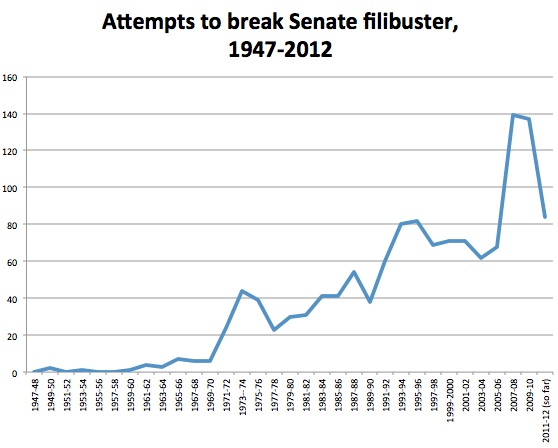Filibuster Reform is Becoming a Hot Topic in Senate

On the heels of last week’s Supreme Court denial to hear claims that the filibuster presents an unconstitutional practice on the part of the minority in the Senate, competing filibuster reform propositions have sprung up recently. The first was proposed earlier this month by Senator Jeff Merkley (D-Oregon) and the other was introduced Friday by Senators John McCain (R-Arizona) and Carl Levin (D-Michigan). Although they both would require a simple majority vote in the Senate to pass, a rare luxury resulting from the transition to the 113th congress, and highly criticized by Republicans, they both address very different concerns surrounding the often-abused legislative safeguard.
Merkley’s proposal, modeled after Senator Tom Harkin’s (D-Iowa) failed reform bid from earlier this year, would institute a ‘talking filibuster’ and reduce the number of votes required for cloture under certain circumstances. Current Senate rules do not require that filibustering legislators actually ‘do’ anything to filibuster a bill, aside from objecting to a unanimous consent request by raising their hand. If his reforms are adopted, Senators would be required to stand and talk for the duration of their filibuster, as well as be subject to a simple majority vote after the extended debate. In his memo outlining the reform, Merkley stated:
“If, at any time during the period of extended debate, no senator were present to speak to the bill, then the presiding officer of the Senate would rule that the period of extended debate is over. The Majority Leader would then schedule a simple majority cloture vote on the bill.”
The current requirement of 30 hours of extended debate or ‘ripening’ remains in place, but would be put to a vote if no one were speaking to prolong debate of the bill. Merkley's proposal is less likely to garner the traditional 67 votes necessary to change Senate rules, but is rumored to possess enough votes to pass through more controversial means, only requiring a simple 51 vote majority.
The McCain, Levin plan strikes a very different tone. Firstly it would eliminate filibustering of pedestrian congressional procedures such as motions to proceed and conference and keep in place the 60-vote requirement for cloture to pass. It guarantees two amendments for the minority and designates greater protections for presidential appointments from filibuster obstruction.
Need for such reforms is apparent when one looks at the explosive nature with which filibusters have been used in Obama’s presidency alone. Proponents of reform like Tom Harkin have lamented the filibuster in its current form, writing on CQ's Roll Call, "The notion that 60 votes are required to pass any measure is not part of the Constitution and until recently would have been considered ludicrous."
Few disagree that the filibuster is no longer serving its intended purpose, but disagreements are abound surrounding the extent to which a new filibuster system should be implemented.



